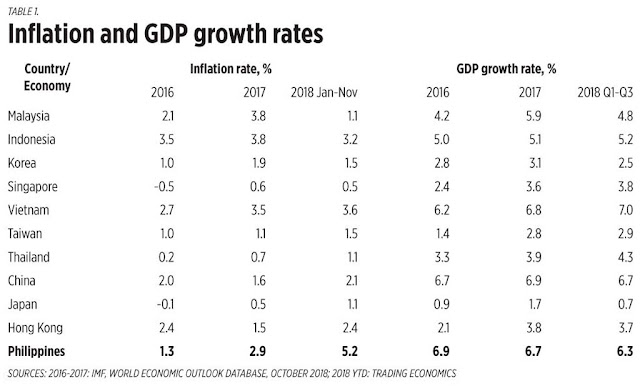* This is my article in BusinessWorld last December 26, 2018.
This list and analysis is more focused on East Asia but a
brief discussion of the US and global economy is also made. Here we go.
1. Despite rising world oil prices, US interest rates,
and other external factors, the inflation rate in the region is declining or
flatlining compared to the 2017 levels — except in the Philippines.
Well, some economies also have had higher inflation in
2018 vs 2017 but with rational explanations. China and Hong Kong’s inflation
only returned to their 2016 levels, Thailand and Japan’s rose to 1% as they
have had very low inflation over the past two years.
2. Malaysia experienced a big decline in inflation after
it abolished the gross sales tax (GST) while the Philippines experienced a big
increase in inflation after the Tax Reform for Acceleration and Inclusion
(TRAIN) law.
Malaysia’s GST went from 6% in May 2018 — Mahathir’s
election promise — to zero in June. There were across-the-board price declines
starting June. Meanwhile the Philippines’ TRAIN law imposed huge hikes in oil,
coal, sugar, and tobacco taxes.
3. Despite adverse external business environments, many
Asian countries experienced up-up, or down-up or up-down growth rates over the
past two years — except the Philippines, which has had down-down growth rates
in 2017 and 2018 compared to 2016.
4. On the so-called “trade war,” the US’ trade and
current account (CA) deficit barely improved but the current account surplus of
China and Hong Kong have significantly declined this year, implying that the
US’ CA deficit is more structural while China’s CA surplus is more political.
5. India, Indonesia, and the Philippines are suffering
from worsening CA deficit situations, implying that their merchandise and
non-merchandise exports are becoming less competitive.
6. US interest rate hikes are significant compared to
fellow industrialized countries like Japan, Germany, and the UK, among others.
This significantly contributed to turmoil in the US and global stocks and
commodities markets.
7. Among emerging Asian economies, the Philippines and
India are suffering from renewed high public debt addiction.
8. There has been good news of a big decline in world oil
prices in the last two months of 2018 — WTI (West Texas Intermediate, also
known as Texas light sweet) oil is now below $50 a barrel, much lower than the
2017 levels. The bad news is that Part 2 of the TRAIN law’s oil and coal tax
hikes will be slammed starting January 2019.
9. The mantra of high oil and carbon taxes to “save the
planet” suffered a big defeat in France, the home of “Paris Agreement.” French
President Macron was forced to cancel and remove the high oil taxes to “fight
(man-made) climate change.”
10. The Duterte government’s “drug war” has, ironically,
coincided with large-scale, multi-billion drugs shipments into the country.
This is related to the rise in the perception of corruption and decline in
business dynamism and growth slowdown.
So, what’s in store for the region and the Philippines in
2019?
The above numbers and related data are showing a trend —
of China’s growth bubble being slowly pricked, of major ASEAN economies showing
economic resilience, of the Philippines becoming the odd-man-out, for the worse.
It looks like this trend will continue in 2019. To help
reverse the Philippines’ growth decline, the government should step back from
huge tax hikes under the TRAIN law, reprioritize integrated PPP (public–private
partnership) and abandon hybrid PPP for infrastructure development. This will
help cure the fiscal disease of spend-spend-spend, tax-tax-tax,
borrow-borrow-borrow exhibited by many governments around the world.
----------------
See also:
BWorld 275, The LNG bill, December 28, 2018
BWorld 276, Fiscal irresponsibility vs household responsibility, December 29, 2018
BWorld 277, Contestable market and the ride-hailing sector, January 14, 2019



No comments:
Post a Comment